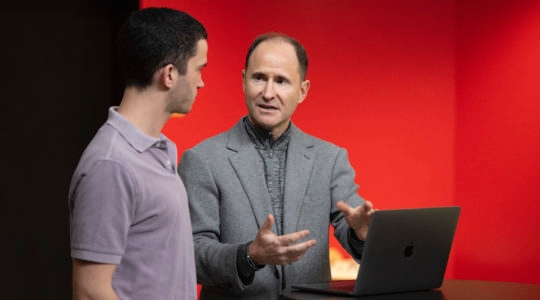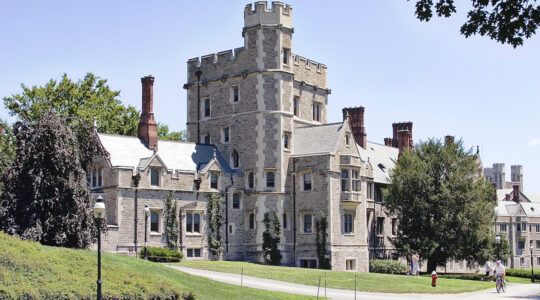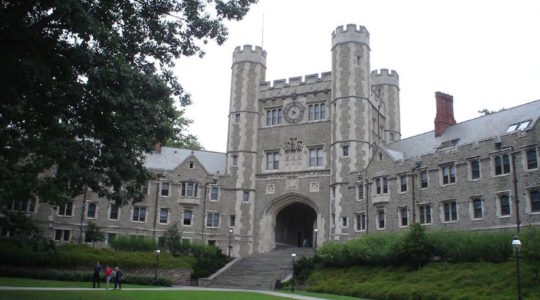
Eric Anderson portrays Shlomo Carlebach in the new off-Broadway musical “Soul Doctor” about the rabbi’s life. (Carol Rosegg)

The company of the off-Broadway musical “Soul Doctor,” about the life of Rabbi Shlomo Carlebach. (Carol Rosegg)
NEW YORK (JTA) — As he researched the complex life of Rabbi Shlomo Carlebach for a new musical, playwright Daniel Wise found a surprisingly candid source.
Neshama Carlebach, a successful recording artist and popular performer of her father’s compositions, openly revealed his many struggles as “a lonely and conflicted” Orthodox rabbi — both rock star and spiritual shepherd.
“When someone collaborates on a show and at the same time is the daughter of the subject matter, and she is serving of the show rather than her own perspective, it helps make the show what it is,” Wise says. “It was also very brave.”
As Neshama explains, her father’s message is that everyone “can surpass their own walls. Some people say he was an angel. He was a person. But he was a strong person. He made beautiful choices and that should be a inspiration for the world.”
Some of Carlebach’s followers aren’t so pleased with the candor about his exploration of the 1960s counterculture and his willingness to go beyond strict Orthodox boundaries.
“Reb Shlomo was a soul on fire who was a rebbe to thousands,” says Shy Yellin, president of the Carlebach Shul on New York City’s Upper West Side. “He was a tzaddik rooted in the love of God and His Torah and whose purpose, like other great rebbes, was to connect us to ‘Hashem yisborech’ in the deepest way. Because he was human, with all the challenges one faces, Shlomo could relate to his flock and we to him. If he made any mistakes, they were long ago expiated. He was beloved by all.”
During his lifetime and perhaps even more since his death in 1994, Rabbi Shlomo Carlebach — known widely as Reb Shlomo or simply Shlomo — is credited with reinvigorating Jewish life with uplifting song and spiritual teachings. His fascinating trajectory is the basis of a Broadway-bound show, “Soul Doctor: The Journey of a Rock Star Rabbi,” the first new Jewish hit musical in decades.
Neshama shares an official “creative credit for additional material” for the show, which is carried by more than 30 Carlebach melodies, often with new lyrics by David Schechter. “Soul Doctor” sold out in test runs in Florida and New Orleans, and opened to a limited engagement July 24-Aug. 19 at the New York Theatre Workshop. Again, the show rapidly sold out.
Producers are negotiating with a New York theater for an open-ended run.
As a cultural phenomenon in the 1960s music scene, Carlebach’s songs grew wildly popular. He performed on stage with Bob Dylan, Joni Mitchell, Jerry Garcia, Pete Seeger, the Grateful Dead and Nina Simone, among others. He played venues from Carnegie Hall to hippie coffeehouses, prisons to ashrams. He even performed spontaneous midnight concerts under New York City’s West Side Highway for the local homeless, whom he often knew by name.
Carlebach died suddenly when his heart failed on airplane at LaGuardia Airport in New York. His annual yahrzeit triggers memorial concerts around the world. In a category all his own, his music now captivates Reform, Reconstructionist, Conservative, gay and lesbian, Orthodox and Chasidic communities.
Cross-over Jewish reggae sensation Matisyahu coined himself a “Bob Marley-Shlomo Carlebach fusion.” Even Pope John Paul II used Carlebach’s composition “Brothers and Friends” to open his last Mass at Giants Stadium in New Jersey.
“Soul Doctor” reveals how Carlebach’s music and heart-centered teachings of “boundless love and joy” touched disillusioned hippies and dropouts, says Wise, who also directs the show.
The musical riffs on the successful formula of “Rent,” which Wise took on tour around the world. Both employ actors playing multiple roles and doubling as stage hands, gracefully transforming sets through scenes.
“Soul Doctor” travels from contemporary Vienna back to Carlebach’s childhood there under Nazi occupation, from a New York home and a dynamic musical beit midrash to the psychedelic House of Love and Prayer in 1960s San Francisco and more, in the multiple loops of Carlebach’s explorations of Jerusalem. Caracas. Nepal. And beyond.
As his newly published commentary on Genesis reveals, Carlebach also was an innovative Torah scholar. As a Chasidic figure and composer of niggunim — wordless, expressive tunes infused with spirituality — Carlebach bridges Old World and new, pre-war Orthodoxy and the post-war establishment he realized wasn’t reaching America’s rapidly assimilating Jews.
Despite its rabbi protagonist, “Soul Doctor” attracts diverse audiences because “It’s about how we are spiritually all the same,” says veteran Broadway composer and orchestrator Steve Margoshes, who wove together the score for “Soul Doctor” and previous Broadway smashes such as Elton John’s “Aida,” “Smokey Joe’s Cafe” and “The Who’s Tommy.”
In the 1950s, the thirtysomething Orthodox rabbi searches American counterculture and becomes intimate friends with Simone, a then-unknown jazz singer who introduced him to gospel music and R&B.
Carlebach suddenly finds himself “torn between his deep traditional roots and his dream to create a Jewish revival through his joyous and soulful melodies,” Margoshes explains. “He wakes up one day and decides the Jewish experience is bankrupt and he is going to reinvigorate it, no matter the personal cost.”
Their unusual connection — Simone later became the musical voice of the civil rights movement — helped Shlomo shape contemporary Jewish music and reinvigorate the American Jewish experience in the aftermath of the Holocaust, Wise says.
With composite characters and scenes, “Soul Doctor” is not a strictly factual presentation of Carlebach’s life. Rather than pure hagiography, it is a gripping exploration of the many challenges and controversies encountered by Carlebach.
“It is more the idea of Shlomo than what historically happened,” says Rabbi Naftali Citrin of the Carlebach Shul and Carlebach’s grand-nephew. “It’s a version of Shlomo’s life that can’t possibly contain everything.”
“Soul Doctor” reflects the humanity of this larger-than-life personality leaving an Orthodox dynasty to become Chasidic while attempting to reach the young and unplugged through conventional rabbinic teachings. The methods prove ineffective, so Carlebach struggles again to break out of the mold of previous Orthodox leaders and “become Shlomo,” the recording star, performer, spiritual minstrel and friend still both treasured and criticized.
One topic the show does not directly touch on are allegations of inappropriate sexual behavior made by some women against Carlebach after his death. Writing in an email to JTA, Wise says he would have tackled the issue, but “after over 100 interviews with credible individuals and researching dozens of credible documents and published articles, there was nothing I could find to support such allegations.”
“What was consistent from the research is that Shlomo was known for his powerful charisma and boundless love. He openly used physical touch and passionate language to help comfort and heal. He did this indiscriminately,” Wise adds. “There were many women to whom Shlomo gave love and affection. Some wanted a more intimate and romantic relationship and then later resented that he did not. While others went on to adapt an ultra-Orthodox Jewish life and have a difficult time reconciling Shlomo as a rabbi who is publicly displays physical affection. We have included this in ‘Soul Doctor’ as a central conflict in the story.”
In the show, Carlebach grapples with questions of modernity and how to heal young broken souls who expect a hug and won’t dance with a mechitzah.
“Soul Doctor” doesn’t shy away from Carlebach’s struggling with his upbringing’s Orthodox restrictions against even casual physical contact with women and intense condemnation from the establishment and his own father. Audiences watch him find love, attempt to balance family with touring, and ultimately encounter a devastating divorce when his wife takes their children — Neshama and her sister, Nedara (now a married mother of two living in Israel) — to Toronto.
Today, the sisters honor their father’s rich contributions to Jewish tradition through the Carlebach Legacy Trust, which collects his teachings, compositions, photographs and bootleg recordings. Neshama, also a mother of two, is working on her ninth album celebrating her father’s music, despite Orthodoxy’s concerns of kol isha, or halachic rulings regarding men hearing women sing. She also is trailblazing interfaith concerts with the Rev. Roger Hambrick and members of the Green Pastures Baptist Church Choir of the Bronx. Their album, “Higher and Higher,” was a sixth-time Grammy entrant last year.
“There is work to be done,” Neshama says, “and not everyone is down for the work.”
(This is Lisa Alcalay Klug’s third article in a JTA series about Rabbi Shlomo Carlebach’s legacy. Klug is the author of two humor books, “Cool Jew: The Ultimate Guide for Every Member of the Tribe,” a National Jewish Book Award finalist, and “Hot Mamalah: The Ultimate Guide for Every Woman of the Tribe,” a celebration of Jewish women debuting in October.)
JTA has documented Jewish history in real-time for over a century. Keep our journalism strong by joining us in supporting independent, award-winning reporting.





